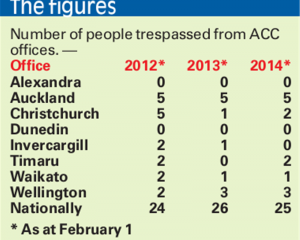Dr Denise Powell, president of Acclaim Otago, a support group for ACC claimants, said that if VIPs had an accident, they received "preferential treatment within ACC".
The corporation's delegation manual stated that these claims were to be handled differently, she said.
"If the service provided by ACC is world leading, why would the manager of the ACC service centre have to handle the VIP claim, rather than the service centre staff?" she asked.
"What is it about ACC's 'normal' service that is insufficient for VIP treatment?"
Dr Powell said while it appeared ACC staff had been instructed to "try everything" to "exit" people from ACC, regardless of whether they had been successfully rehabilitated, "VIP status" seemed to be focused on "insulating those with influence over ACC; those who make the law, interpret the law and oversee its application".
"By wrapping them in cotton wool, ACC prevents them from being subjected to their 'try-everything' approach that results in so much heartache to ordinary New Zealanders," she said.
Asked whether its VIP approach amounted to preferential treatment, an ACC spokeswoman said the practice for claims "categorised as VIP on ACC's registration and claim management systems" followed "the standard allocation and management processes applied to all claims".
"The only difference being security rights and who can make decisions on the claim," she said.
VIP claims would be dealt with in the same way as other claims, but the final decision would be taken at a more senior level, rather than by more junior staff.
She confirmed "security rights" referred to "extra measures to maintain VIP confidentiality".
Dr Powell said it was time "such anomalies within ACC" were investigated and explained.
New Zealand was a nation that prided itself on fairness and equality.
"The very mechanisms like ACC, that were designed to promote fairness and rehabilitation for everyone, should never have been allowed to be used to give preferential treatment to one group of New Zealanders over another," she said.





